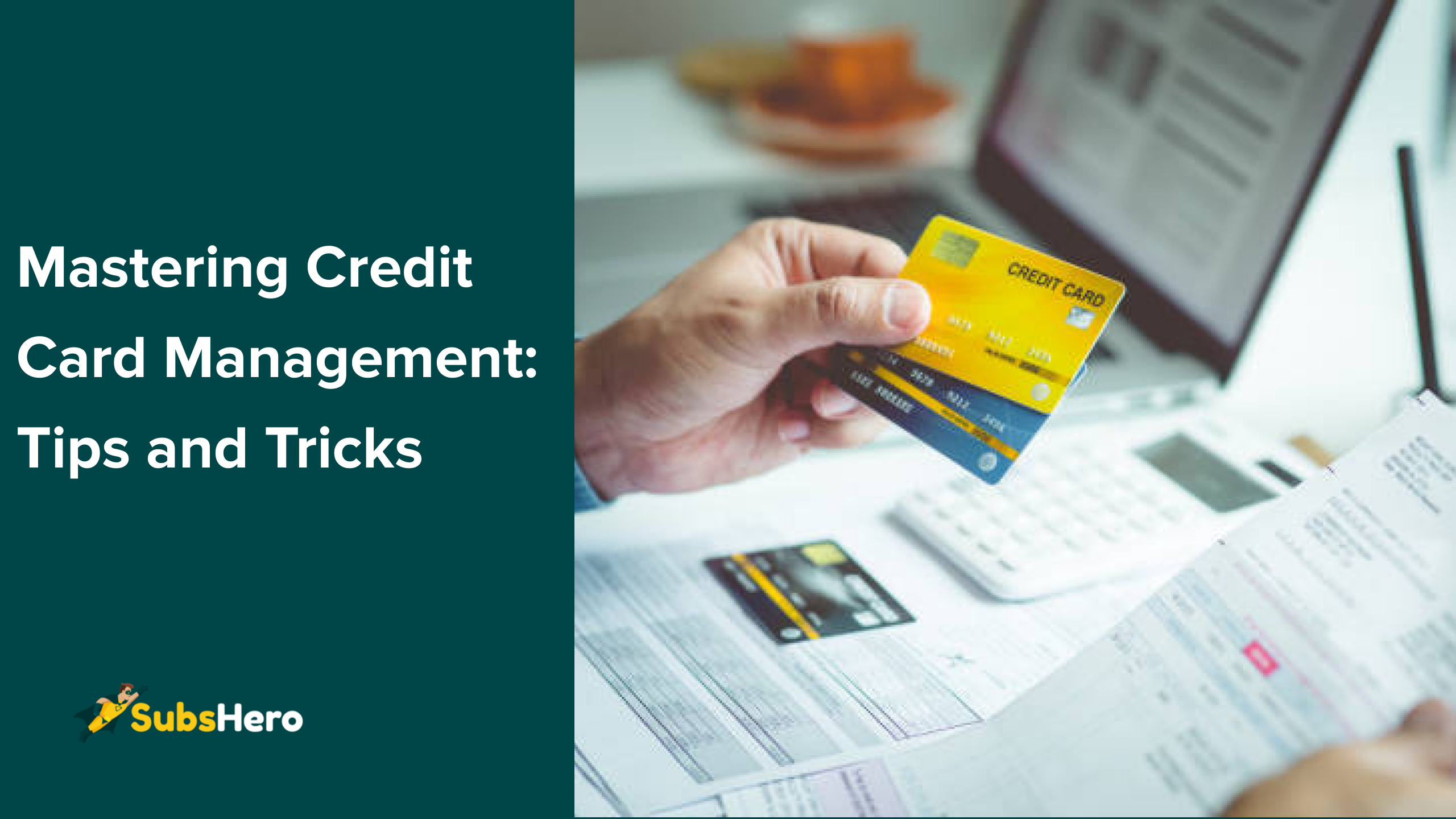Mastering Credit Card Management: Tips and Tricks
Credit cards can come with a lot of benefits, but they can also cause headaches if not managed properly. In this blog, we will discuss mastering credit card management with tips and tricks that can help you maximize rewards, understand credit card utilization, manage credit card alerts, pay bills on time, and more. We will also provide tips for effective credit card management to help you use credit card apps for easy management, set up auto-pay for hassle-free payments, keep your credit utilization low, know when to upgrade your credit card, and build and maintain a good credit score.
Lastly, we’ll talk about common mistakes to avoid such as overspending and carrying high balances while highlighting the importance of understanding different types of rewards programs and maximizing cash-back rewards. With our expert advice, you’ll be able to master credit card management in no time!
Mastering Credit Card Management

How to Maximize Rewards
To maximize credit card rewards, it’s crucial to choose a rewards credit card that fits your lifestyle and spending habits. Once you have one, it’s important to pay off the balance in full each month to avoid high-interest charges and better utilize any cashback or mile rewards earned.
Additionally, always be sure to redeem your accumulated rewards wisely based on their current value rather than simply hoarding them. Lastly, take advantage of automatic payments as an efficient way to avoid late fees and boost your credit score over time.
Understanding Credit Card Utilization
Managing credit cards involves understanding various aspects such as the importance of APR, rewards programs, and most importantly, understanding credit card utilization. It refers to the percentage of available credit that you use each month. Keeping this ratio below 30% can positively impact your credit score.
Avoid maxing out your card limit and make timely payments on or before the due date to maintain good standing with the lender. You could also consider requesting a higher limit from your card issuer.
The Importance of APR
Understanding the Importance of APR in managing personal finance is essential. One must always pay attention to promotional rates as they may expire after a certain period and result in higher interest charges on credit card debt. To avoid such situations, it’s advisable to transfer high-interest balances to a lower APR card or negotiate with the card issuer for a better rate.
Monitoring one’s APR regularly can help stay on top of their credit utilization ratio and reduce any unnecessary fees charged by the lender.
Managing Credit Card Alerts
If you’re looking to manage your credit card better, one crucial aspect is to set up alerts for significant purchases, balance changes, and unusual transactions. Opt for an alert method that works best for you; this could include email, text messages, or push notifications.
Ensure that you have thoroughly reviewed and understood the alert policies of your card issuer before activating them. This will help you track any unauthorized use of your credit card and stay in control of your expenses.
Paying Credit Card Bills on Time
Maintaining good credit standing is an essential aspect of personal finance. Paying off your credit card bills on time is a significant factor that contributes to a good credit score. Late payments can lead to high-interest charges and late fees imposed by the card issuer.
Setting up automatic payments or manually paying off the balance before the balance due date keeps you from incurring these unnecessary charges. Reviewing your monthly statements helps detect errors and fraudulent charges. Paying your bills on time plays a pivotal role in keeping up with excellent credit scores and avoiding unfavorable fees.
Tips for Effective Credit Card Management

Using Credit Card Apps for Easy Management
Credit card issuers offer various apps that can help you with credit card management. These apps can be convenient when it comes to managing credit cards as they allow you to have all the information in one place. Apps like Mint and Credit Karma can help you keep track of your spending habits and also provide personalized recommendations for credit cards that fit your financial needs.
Furthermore, these apps enable users to set up notifications for payment due dates and account balances which helps avoid late payments that may result in late fees or damage to their credit score.
Setting Up Auto-Pay for Hassle-Free Payments
By setting up automatic payments for your credit card bills, you can save time and avoid late fees and potential damage to your credit score. Whether you choose to pay the minimum balance or the full amount each month, it’s essential to regularly check your statements for any unauthorized charges or fraudulent activity.
Prioritizing payments based on interest rates or balances can also help you effectively manage your credit card debt. Take advantage of this convenient feature offered by most credit card issuers and never miss a payment again.
Keeping Your Credit Utilization Low
One of the most important factors in managing your credit card is keeping your credit utilization rate low. This means paying off the balance in full or making multiple payments throughout the billing cycle to lower the amount of credit you’re using compared to what’s available.
Experts suggest keeping the ratio below 30% and increasing available credit by requesting a higher limit from your card issuer or paying down debt. By doing so, you’ll improve your good standing with lenders and avoid interest charges and late fees that can damage your credit score.
Knowing When to Upgrade Your Credit Card
Upgrading your credit card can help maximize rewards and benefits. It’s crucial to be familiar with the signs indicating that an upgrade is necessary. If you’re using a particular card for a long time and you’re not happy with its performance in terms of rewards and perks, consider upgrading to a new option.
Ensure that the new card offers better rewards aligned with your spending habits and has an annual fee that does not offset the benefits offered. Before applying for a new card, check if you meet their credit score requirements.
Maximizing Rewards with a Strategy
To maximize your rewards, start by choosing the right credit card issuer based on your lifestyle needs and credit score. Use notifications to keep track of important factors like utilization rate and payment history to avoid late payments and interest charges. Be sure to pay your credit card bill on time each month and never carry a high balance or overspend.
Consider signing up for travel rewards credit cards that offer welcome offers or sign-up bonuses for new customers in good standing, as well as perks such as airline miles or warranties for balance transfers.
Managing Multiple Credit Cards
Simplifying managing multiple credit cards is possible by consolidating them into one account or using a budgeting app. You can set up automatic payments, limit the number of credit cards you manage, and review statements regularly to avoid any fraudulent activity.
Managing multiple credit cards responsibly is an important factor in maintaining a good credit score and avoiding late payment fees and interest charges. By following these tips, you will be able to handle multiple credit card accounts easily and efficiently.
Building and Maintaining a Good Credit Score
A good credit score is essential in obtaining loans, financial services, and of course a rewards card from your chosen issuer. When building and maintaining a good credit score you need to make sure you’re paying personal finance bills on time to avoid late fees or interest charges. Keep in mind that opening too many new accounts at once could lower your FICO rating.
It’s important to monitor your report for any errors or identity theft which could affect your utilization rate. Utilizing the right rewards card with perks such as cashback or travel miles can help you save money while building an excellent credit history.
Common Credit Card Management Mistakes to Avoid

Understanding Credit Limits and Balances
Managing your credit card is not only about paying bills on time but also understanding the limits and balances. To maintain a good credit score, make sure that you keep your balances at or below 30% of the credit limit.
Paying the balance in full every month can save you from being charged with interest rates. Try using an app from the card issuer to keep track of the available credits and payments according to the billing cycle. Remember to avoid taking cash advances because of the high-interest rates and fees that come along with them.
The Dangers of Carrying a High Balance
When you’re managing your credit card, being mindful of carrying a high balance is crucial. The consequences of carrying a high balance are not limited to high-interest charges and debt accumulation but also include an extended timeframe for clearing the debts and adversely affecting your credit score.
As a result, obtaining loans or credits becomes even harder. To steer clear of these cons while doing credit card management, it’s advisable to pay more than just the minimum payment each month by using the app provided by the card issuer and sticking to necessary expenses only.
The Risks of Overspending and Debt
To avoid accruing high-interest charges on credit card balances and worsening one’s financial situation with prolonged repayment periods due to payment of only minimum balances while negatively affecting one’s credit score with late or missed payments on the debt accumulated from overspending on the card or cards issued by a given issuer, creating a personal budget with strict adherence to spending limits as tracked through apps provided by the card issuers can be helpful.
Checking monthly statements for inaccuracies or fraudulent activities as well as paying outstanding balances in full every billing cycle is essential for better management of one’s finances.
Credit Card Rewards

Types of Credit Card Rewards Programs
Credit card users have several options when it comes to choosing a rewards program. Among these are cashback, travel rewards, and discount rewards programs.
Cashback rewards provide a percentage of every dollar spent as cash back, whereas travel rewards earn points or miles redeemable for flights and other travel expenses.
Discount reward programs offer incentives through partnerships with specific retailers or through discounts on certain purchases. It’s important to choose a program that aligns with one’s spending habits and lifestyle.
Maximizing Cash Back Rewards
To maximize cash-back rewards from your credit card issuer, look for a card that offers high rates on frequent purchases. Don’t forget to take advantage of bonus cashback rates in specific categories like dining or gas stations.
Keep an eye on the detailed terms and conditions of your credit card rewards program to avoid fees while earning more. Redeeming your earned perks through statement credit or gift cards is crucial for getting the most value out of what you’ve earned.
Conclusion
Credit card management is a crucial aspect of financial wellness. By maximizing rewards, understanding credit utilization, and managing bills and alerts, you can keep your finances organized and in check. Using credit card apps and setting up auto-payments can make the process even more hassle-free.
However, it’s important to avoid common mistakes such as overspending, carrying high balances, or not upgrading your credit card when necessary. Maximizing cash-back rewards is also a great way to make the most of your credit cards. Want to learn more about effective credit card management? Download our comprehensive guide now.













